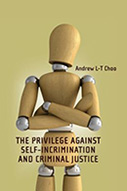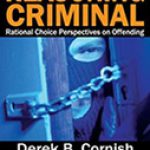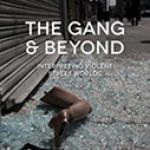The Privilege Against Self-Incrimination and Criminal Justice

Author: Andrew L-T Choo
Publisher: Oxford, UK; Portland, OR:Hart Publishing, 2013. 180p.
Reviewer: George C. Thomas III | July 2014
I have long thought that the Supreme Court’s jurisprudence on the privilege against compelled self-incrimination is both complex and, at the edges, imprecise. For example, the Court has held that being compelled to produce an existing document is usually not a violation of the privilege because the relevant act is the creation of the document, which is non-compelled. But the Court has also held that sometimes the act of production can itself be “testimony,” in which case the subpoena can be successfully resisted. See United States v. Hubbell, 530 U.S. 27 (2000). Determining when an act of production can be testimony is maddeningly difficult. Responding to a subpoena for the diary of Dr. Jekyll might be testimony because it admits that there is a diary or it authenticates that the document produced is Jekyll’s diary. But it might not be testimony if the government already knows that Jekyll has a diary and if it can be authenticated by Jekyll’s handwriting.
But my impatience with the Fifth Amendment privilege jurisprudence has been cured by Andrew L-T Choo’s book. Though Choo includes short sections on the law of the commonwealth countries and the United States, the book is principally about the privilege against compelled self-incrimination in England and Wales as it is constrained or modified by the European Convention of Human Rights. It is a remarkably shifting kaleidoscope of overlapping statutes, English case law, and European Court of Human Rights case law. The Table of Legislation for the United Kingdom alone lists over 300 statutes that bear on the privilege against compelled self-incrimination.
I think I can explain in a few words the basic law of compelled self-incrimination in the United States. No one can be compelled to provide testimony that might be used to incriminate him in a criminal case. That explains why Lois Lerner or Oliver North cannot be compelled to answer questions before a congressional committee. It explains why although witnesses can be compelled to appear before a grand jury, they cannot be compelled to answer questions that might tend to incriminate them. This leaves a bit unsaid, in addition to the problem of whether documents are testimony. There is the Court’s odd conception of compulsion in Miranda v. Arizona, 384 U.S 436 (1964). And there is the problem of why comments on a defendant’s failure to testify violate the privilege. See Griffin v. California, 388 U.S. 609 (1965). But my global statement of the American privilege explains its core.
But when I finished Choo’s book, I could not tell you what is the core of the privilege in the UK. I do not think it has a core. Can the UK privilege be abrogated by statute? Perhaps, but this might violate an article in the European Convention of Human Rights. (114-115.) Does the English privilege have a “firm theoretical foundation”? No. (118.). Is it “all a matter of balancing”? Yes. (116.) Does it make only a “modest contribution” to protecting rights? Yes. (119.) In short, the privilege against compelled self-incrimination in the UK could be “abandoned altogether” if it were replaced with robust pre-trial regulation of evidence gathering. (120.) In this, if in nothing else, I think the colonies have surpassed the mother country.


